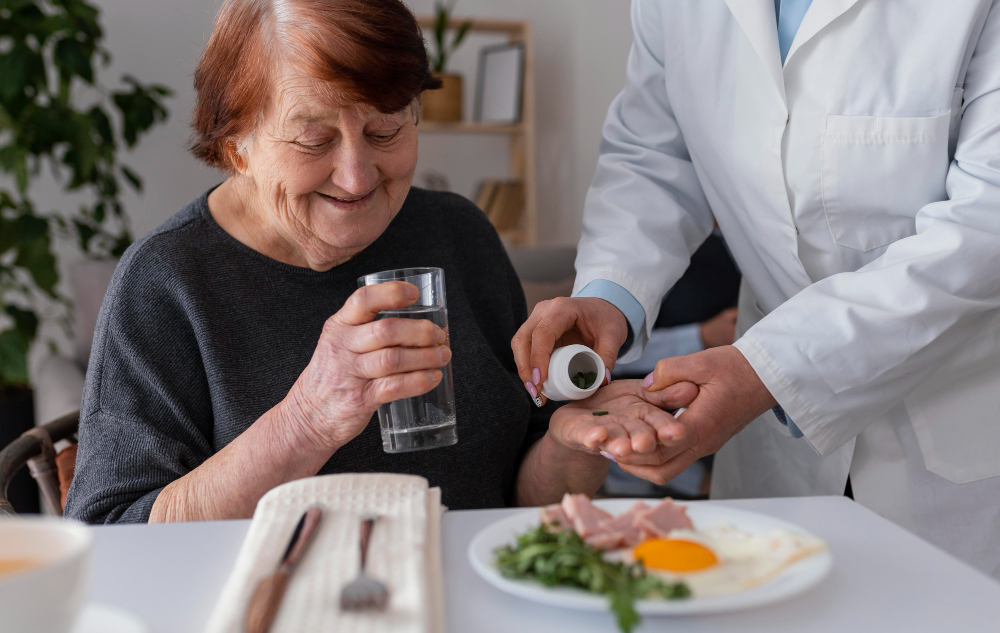
Diabetes management in seniors involves a multifaceted approach tailored to the unique challenges of aging. As our loved ones grow older, their bodies undergo various changes that can impact managing diabetes.
This blog offers strategies and tips for managing diabetes in seniors, focusing on diet, medication, lifestyle adjustments, and regular monitoring.
Understanding the Unique Challenges of Diabetes in Seniors
As people age, changes in insulin sensitivity, metabolism, and organ function can complicate diabetes management. Additionally, seniors often face multiple chronic conditions that require careful coordination of care. Understanding these complexities is crucial for developing an effective management plan.
Different Types of Diabetes
Type 1 Diabetes
Although typically diagnosed in younger individuals, Type 1 diabetes can persist into old age. Seniors with this condition require ongoing insulin therapy and close monitoring.
Type 2 Diabetes
This form is more common in older adults and is often associated with lifestyle factors. It can be managed through a combination of diet, exercise, and medication.
Pre-diabetes
In this stage, blood sugar levels are elevated but not yet high enough for a diabetes diagnosis. Early intervention can prevent the progression of Type 2 diabetes.
Diet and Nutrition: Key to Managing Blood Sugar
A well-balanced diet plays a vital role in controlling blood sugar levels and supporting overall health.
Focus on Complex Carbohydrates
Encourage your senior loved ones to consume whole grains, legumes, and vegetables over refined sugars to maintain stable blood sugar levels.
Balanced Meals
Incorporate lean proteins, such as chicken and fish, along with healthy fats from avocados and nuts into their diet. Proper hydration is also essential, so drinking plenty of water is recommended.
Regular Meal Times
Maintaining a consistent eating schedule helps avoid significant fluctuations in blood sugar levels. Aim for three balanced meals daily, with snacks as needed.
Medication Management for Consistency
Adhering to a prescribed medication regimen is critical. Establishing a routine for taking medications at the same time each day, along with the use of pill organizers, can help prevent missed doses and ensure effective diabetes management.
Regular Blood Sugar Monitoring
Frequent blood glucose monitoring provides insight into how well diabetes is being controlled. Following healthcare provider recommendations and using home monitoring devices, can guide necessary adjustments to the management plan. Elder care service providers in Kolkata offer a range of emergency medical devices such as glucometers, blood pressure monitors, oxygen cylinders, etc available for both purchase and rental, ensuring that your loved ones have access to vital equipment when they need it most.
Importance of Physical Activity
Exercise is an essential component of diabetes management, offering benefits for both physical and mental health. Seniors should engage in low-impact activities like walking or swimming and incorporate strength training to maintain muscle mass. Aiming for at least 150 minutes of moderate-intensity exercise per week is ideal.
Addressing Other Health Conditions
Diabetes management often involves managing related health issues:
Cardiovascular Health
Monitoring blood pressure and cholesterol levels is crucial, as diabetes increases the risk of heart disease. A heart-healthy diet and regular exercise are key preventive measures.
Kidney Health
Regular kidney function tests are necessary, as diabetes can impair kidney health. Staying hydrated and following a diet that supports kidney function is also important for senior loved ones. You can access in-home pathology services for your senior loved ones to ensure they receive convenient care without needing to travel.
Foot Care
Daily foot inspections can help detect any cuts or blisters early, as diabetes can reduce sensation in the feet. Wearing well-fitting shoes is essential to prevent injuries.
Mental and Emotional Well-Being
Managing diabetes can be stressful, making emotional support a vital part of care. Techniques such as meditation and relaxation exercises, along with engaging in hobbies and maintaining social connections, can improve mental well-being.
Education and Emergency Preparedness
Empowering seniors with knowledge about diabetes and how to manage it is key to long-term success. Utilize educational resources, and ensure that seniors have an emergency plan, including a contact list and a kit with necessary supplies like glucose tablets and insulin.
Effectively managing diabetes in seniors requires a comprehensive and individualized approach that considers the unique challenges of aging. By focusing on diet, medication, physical activity, and mental well-being, seniors can maintain better control of their diabetes and enjoy an improved quality of life.